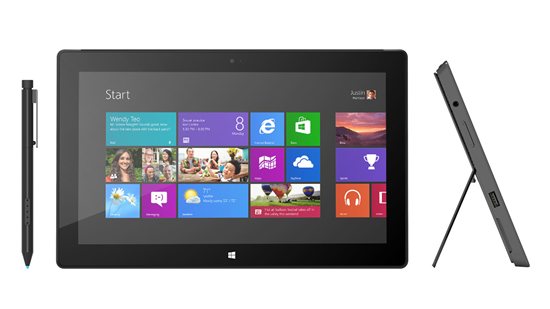Microsoft Surface Pro Appears In US Shops

Microsoft’s upcoming x86-powered tablet has begun appearing in major US retail outlets ahead of its official launch this weekend
In stark contrast to how Microsoft handled the Surface RT launch, the company appears willing – if not more than a little eager – to get Surface Pro in front of consumers by distributing early floor units to retailers like Best Buy in the US.
Microsoft appears to have learned from its early struggles in the tablet market. Not only is the company selling Surface Pro, which runs through more retail channels, it’s letting consumers get an early look ahead of its official release on 9 February.
Live demonstrations
Shoppers are reporting that Surface Pro tablets are showing up at the demo stations of select retailers in the US, according to Engadget. And Microsoft has reason to let the public test-drive the Surface Pro as early as possible.
 In the weeks following its launch, Surface RT was only available through Microsoft’s online store and Microsoft’s own physical retail outlets. And unlike retail chains like Best Buy and Staples, or shops operated by its rival Apple, Microsoft Stores are a rare sight in many parts of the US.
In the weeks following its launch, Surface RT was only available through Microsoft’s online store and Microsoft’s own physical retail outlets. And unlike retail chains like Best Buy and Staples, or shops operated by its rival Apple, Microsoft Stores are a rare sight in many parts of the US.
For example, Microsoft currently lists four physical stores in all of New York State, mostly in the New York City area. Apple, by comparison, has five retail stores in Manhattan alone.
This severely limited Surface RT’s exposure to consumers, particularly Christmas shoppers, and resulted in disappointing sales. According to UBS, Microsoft only managed to sell 1 million Surface RT tablets in the fourth quarter of 2012.
Microsoft did not release official Surface sales figures during its latest earnings call, signalling that the company did not reach its sales goals.
Boston-based brokerage firm Detwiler Fenton blamed Surface RT’s poor performance in its early weeks on a distribution model that was in “disarray”.
In December, Microsoft reversed course and began offering the tablet at Best Buy and other retailers.
Windows RT
Further limiting its appeal is the fact that Surface RT runs Windows RT, a version of Windows 8 for devices with ARM-based processors. Windows RT tablets cannot run x86 software, which describes the vast majority of applications in the Windows ecosystem.
Surface Pro, which officially goes on sale on 9 February, runs the full version of Windows 8 Pro.
Last week, Apple stunned the industry by announcing a 128GB version of the iPad that will go on sale on 5 February, setting the stage for a showdown with Surface Pro.
It will carry a price tag of $799 (£508) for the Wi-Fi-only model and $929 for a version with 4G Long-Term Evolution (LTE) technology.
While it offers consumers more storage space for their apps and media, Apple is clearly targeting the enterprise. In a press release, the company said, “iPad continues to have a significant impact on business with virtually all of the Fortune 500 and over 85 percent of the Global 500 currently deploying or testing iPad.”
Now that it can offer a high-capacity model, Apple is positioning the iPad for big, business-oriented mobile workloads.
“Companies regularly utilising large amounts of data such as 3D CAD files, X-rays, film edits, music tracks, project blueprints, training videos and service manuals all benefit from having a greater choice of storage options for iPad,” stated Apple.
Premium pricing
Microsoft, meanwhile, is betting that it has built up enough goodwill over the years among enterprise IT departments and power users.
Surface Pro prices start at $899 for the 64GB model and jump to $999 for the 128GB version. It’s a premium that many may be willing to pay.
Early reviewers are bullish on the tablet’s chances in the market. Most have walked away impressed by its potent Intel Core i5 processor, dazzling display and the ability to run full versions of desktop software like Adobe Photoshop on a tablet form factor.
Do you know all about UK tech leader ARM Holdings? Take our quiz!
Originally published on eWeek.